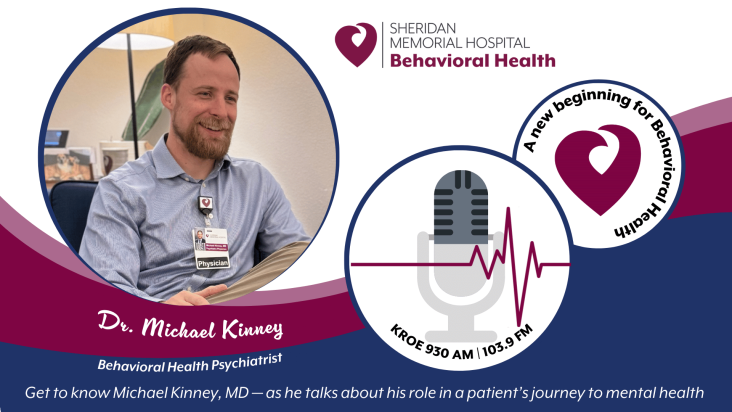When Dr. Michael Kinney and his wife, Lindsay, first arrived in Sheridan, they were looking for something more than a beautiful place to live. They were seeking impact.
“We wanted to make a big splash in a little pond,” Dr. Kinney shared during a recent interview on Public Pulse with host Floyd Whiting. That desire led him to Sheridan Memorial Hospital, where he now serves as the organization’s psychiatrist, serving patients ages 13 and older.
And that splash? It’s already rippling.
Building behavioral health service from the ground up
Dr. Kinney joined Sheridan Memorial Hospital in late 2024 and quickly stepped into a role that was as foundational as it was formidable — building a behavioral health clinic from the ground up.
“It’s intimidating,” he admitted. “But exciting.”
With no existing psychiatry infrastructure in the hospital system, Dr. Kinney and Director of Behavioral Health Brittany Goodvin have taken on the challenge of creating not just a clinic, but a new model of care — patient-focused, data-informed and stigma-free.
Rather than being overwhelmed by the size of the mission, they’ve approached it one piece at a time.
“Let’s not look at the whale,” Kinney said. “Let’s take just pieces of it off at a time.”
Meaningful metrics and measurable impact
One of the most promising signs of success so far? A nearly 20% reduction in the use of emergency hold proceedings under Wyoming’s Title 25 since the clinic opened. Dr. Kinney sees that number not only as a marker of progress but also as an early indicator that the community is gaining access to care in a more timely and supportive way.
And the future is even brighter. With the hospital’s behavioral health facility currently under construction — featuring a crisis stabilization area, inpatient beds and expanded outpatient therapy spaces — Sheridan Memorial is preparing to meet a broader spectrum of mental health needs with compassion and skill.
Psychiatry rooted in purpose
Dr. Kinney’s journey into medicine wasn’t linear. Initially pursuing law, it wasn’t until a volunteer EMT call — where a child in distress looked up at him “like [he] was Superman” — that he realized his calling was to be a different kind of helper.
That sense of calling became even more personal after the tragic loss of his brother to addiction and mental illness.
“He didn’t survive those issues,” Kinney said. “And that’s part of what drives me now.”
Kinney speaks openly about that grief and how it shaped his desire to become a psychiatrist unafraid of addressing addiction.
“I don’t want to do this halfway,” he said. “I want to be able to take care of the whole person.”
A philosophy of thoughtful care
In an age where medication can feel like a quick fix, Dr. Kinney is refreshingly intentional. He uses metaphor to explain the role of treatment: if mental health challenges are a Wyoming blizzard, then medication is the pair of boots that keeps your feet warm—but it’s therapy that helps you find your way out of the storm.
“Some people need the boots longer than others. But nobody should feel like they have to weather it alone.”
Kinney also emphasizes the importance of accurate diagnosis. He noted that a significant number of patients he sees arrive with labels like bipolar disorder that may not fit. His approach involves “getting back to the drawing board,” with careful attention to both removing unnecessary medications and prescribing only what’s needed to support healing.
Community matters
One thing is clear: Kinney is here for Sheridan. He praises the region’s strength and resilience while recognizing the need to shift cultural attitudes around mental health.
“This is a place that takes care of others,” he said. “But to do that well, we have to start by taking care of ourselves.”
And that begins with making it easier — and more normal — to ask for help.
“Pay attention to how you feel,” he said. “Honor your emotions. That’s where healing starts.”
At Sheridan Memorial Hospital, the addition of Dr. Kinney is part of a larger commitment to transform how the community understands, accesses and receives behavioral health care.
🎧 Listen to Dr. Kinney’s full interview on Public Pulse by clicking below.
To speak with someone about behavioral health services at Sheridan Memorial Hospital, visit Behavioral Health – Sheridan Memorial Hospital or call 307.675.2674.


